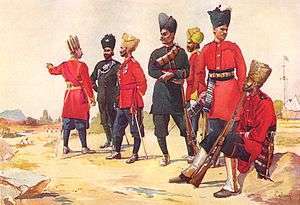119th Infantry (The Mooltan Regiment)
| 119th Infantry (The Mooltan Regiment) | |
|---|---|
|
A depiction of a subadar of the 119th Infantry (third from left) amongst other British Indian Army troops | |
| Active | 1817–1922 |
| Country |
|
| Branch |
|
| Type | Infantry |
| Part of |
Bombay Army (to 1895) Bombay Command |
| Colors | Red; faced deep yellow, 1882 yellow |
| Engagements |
First Afghan War Second Anglo-Sikh War Second Afghan War World War I |
The 119th Infantry (The Mooltan Regiment) was an infantry regiment of the British Indian Army. The regiment originated in 1817, when it was raised as the 1st Battalion, 10th Regiment of Bombay Native Infantry.
The regiment's first action was in the Battle of Ghazni in the First Afghan War. After Afghanistan it took part in the Siege of Multan in the Second Anglo-Sikh War. It returned to Afghanistanin the Second Afghan War and took part in the Siege of Multan. During World War I it was attached to the 6th (Poona) Division and served in the Mesopotamian campaign. It fought in the Battle of Basra, the Battle of Qurna, the Battle of Es Sinn before suffering a setback at the Battle of Ctesiphon, after which it withdrew to Kut. Trapped in the city in the Siege of Kut the regiment was forced to surrender after 147 days.[1] A second battalion was raised from men on leave and reinforcements, and sent to Mesopotamia.[2]
After World War I the Indian government reformed the army moving from single-battalion to multi-battalion regiments.[3] In 1922 the 119th became the 2nd (Mooltan Battalion), 9th Jat Regiment.[4] After independence it was one of the regiments allocated to the Indian Army.
Predecessor names
- 1st Battalion, 10th Regiment of Bombay Native Infantry – 1817
- 19th Bombay Native Infantry – 1824
- 19th Bombay Infantry – 1885
- 119th Infantry (The Mooltan Regiment)[5]
References
- ↑ Gardner 2004, pp. 307–326.
- ↑ Sharma 1990, p. 158.
- ↑ Sumner 2001, p. 15.
- ↑ Sharma 1990, p. 159.
- ↑ Sharma 1990, p. 157.
Sources and further reading
- Barthorp, Michael; Burn, Jeffrey (1979). Indian infantry regiments 1860-1914. Osprey Publishing. ISBN 0-85045-307-0.
- Gardner, Nikolas (2004). "Sepoys and the Siege of Kut-Al-Amara, December 1915-April 1916". War in History. 11 (3): 307–326. doi:10.1191/0968344504wh302oa.
- Moberly, FJ (1923). Official History of the War: Mesopotamia Campaign. London: Imperial War Museum. ISBN 1-870423-30-5.
- Rinaldi, Richard A (2008). Order of Battle British Army 1914. Ravi Rikhye. ISBN 0-9776072-8-3.
- Sharma, Gautam (1990). Valour and sacrifice: famous regiments of the Indian Army. Allied Publishers. ISBN 81-7023-140-X.
- Sumner, Ian (2001). The Indian Army 1914–1947. Osprey Publishing. ISBN 1-84176-196-6.
